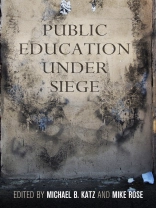Proponents of education reform are committed to the idea that all children should receive a quality education, and that all of them have a capacity to learn and grow, whatever their ethnicity or economic circumstances. But though recent years have seen numerous reform efforts, the resources available to children in different municipalities still vary enormously, and despite landmark cases of the civil rights movement and ongoing pushes to enact diverse and inclusive curricula, racial and ethnic segregation remain commonplace. Public Education Under Siege examines why public schools are in such difficult straits, why the reigning ideology of school reform is ineffective, and what can be done about it.
Public Education Under Siege argues for an alternative to the test-driven, market-oriented core of the current reform agenda. Chapters from education policy experts and practitioners critically examine the overreliance on high-stakes testing, which narrows the content of education and frustrates creative teachers, and consider how to restore a more civic-centered vision of education in place of present dependence on questionable economistic models. These short, jargon-free essays cover public policy, teacher unions, economic inequality, race, language diversity, parent involvement, and leadership, collectively providing an overview of the present system and its limitations as well as a vision for the fulfillment of a democratic, egalitarian system of public education.
Contributors: Joanne Barkan, Maia Cucchiara, Ansley T. Erickson, Eugene E. Garcia, Eva Gold, Jeffrey R. Henig, Tyrone C. Howard, Richard D. Kahlenberg, Harvey Kantor, Michael B. Katz, David F. Labaree, Julia C. Lamber, Robert Lowe, Deborah Meier, Pedro Noguera, Rema Reynolds, Claire Robertson-Kraft, Jean C. Robinson, Mike Rose, Janelle Scott, Elaine Simon, Paul Skilton-Sylvester, Joi A. Spencer, Heather Ann Thompson, Tina Trujillo, Pamela Barnhouse Walters, Kevin G. Welner, Sarah Woulfin.
Table of Content
Introduction
PART I. THE PERILS OF TECHNOCRATIC EDUCATIONAL REFORM
Chapter 1. The Mismeasure of Teaching and Learning: How Contemporary School Reform Fails the Test
—Mike Rose
Chapter 2. Views from the Black of the Math Classroom
—Joi A. Spencer
Chapter 3. Targeting Teachers
—David F. Labaree
Chapter 4. Firing Line: The Grand Coalition Against Teachers
—Joanne Barkan
Chapter 5. The Bipartisan, and Unfounded, Assault on Teachers’ Unions
—Richard D. Kahlenberg
Chapter 6. Free-Market Think Tanks and the Marketing of Education Policy
—Kevin G. Welner
Chapter 7. The Price of Human Capital: The Illusion of Equal Educational Opportunity
—Harvey Kantor and Robert Lowe
Chapter 8. Educational Movements, Not Market Moments
—Janelle Scott
PART II. EDUCATION, RACE, AND POVERTY
Chapter 9. Public Education as Welfare
—Michael B. Katz
Chapter 10. In Search of Equality in School Finance Reform
—Pamela Barnhouse Walters, Jean C. Robinson, and Julia C. Lamber
Chapter 11. ‘I Want the White People Here!’: The Dark Side of an Urban School Renaissance
—Maia Cucchiara
Chapter 12. The Rhetoric of Choice: Segregation, Desegregation, and Charter Schools
—Ansley T. Erickson
Chapter 13. Criminalizing Kids: The Overlooked Reason for Failing Schools
—Heather Ann Thompson
PART III. ALTERNATIVES TO TECHNOCRATIC REFORM
Chapter 14. Abandoning the Higher Purposes of Public Schools
—Deborah Meier
Chapter 15. Equity-Minded Instructional Leadership: Turning Up the Volume for English Learners
—Tina Trujillo and Sarah Woulfin
Chapter 16. Professional Unionism: Redefining the Role of Teachers and Their Unions in Reform Efforts
—Claire Robertson-Kraft
Chapter 17. Pushing Back: How an Environmental Charter School Resisted Test-Driven Pressures
—Paul Skilton-Sylvester
Chapter 18. The Achievement Gap and the Schools We Need: Creating the Conditions Where Race and Class No Longer Predict Student Achievement
—Pedro Noguera
Chapter 19. !Ya Basta! Challenging Restrictions on English-Language Learners
—Eugene E. Garcia
Chapter 20. Sharing Responsibility: A Case for Real Parent-School Partnerships
—Rema Reynolds and Tyrone C. Howard
Chapter 21. Calling the Shots in Public Education: Parents, Politicians, and Educators Clash
—Eva Gold, Jeffrey R. Henig, and Elaine Simon
PART IV. CONCLUSIONS
Chapter 22. What Is Education Reform?
—Michael B. Katz and Mike Rose
Chapter 23. A Letter to Young Teachers: The Graduation Speech You Won’t Hear, But Should
—Mike Rose
List of Contributors
Acknowledgments
About the author
Michael B. Katz is Walter H. Annenberg Professor of History and Research Associate of the Population Studies Center at the University of Pennsylvania. He is also author of Why Don’t American Cities Burn? and The Price of Citizenship: Redefining the American Welfare State, both available from the University of Pennsylvania Press. Mike Rose is Professor at the Graduate School of Education and Information Studies at the University of California, Los Angeles, and author of Back to School: Why Everyone Deserves a Second Chance at Education.












